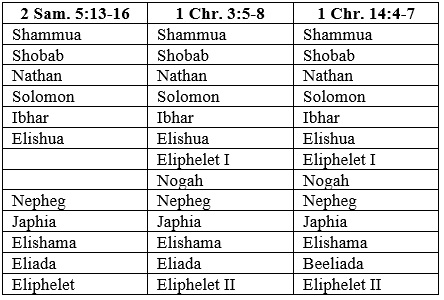God’s Word for You
1 Chronicles 14:3-7 David’s later children
by Pastor Timothy Smith on Monday, January 1, 2024
3 In Jerusalem David took more wives and became the father of more sons and daughters. 4 These are the names of the sons born to him in Jerusalem: Shammua, Shobab, Nathan, Solomon, 5 Ibhar, Elishua, Elpelet, 6 Nogah, Nepheg, Japhia, 7 Elishama, Beeliada and Eliphelet.
There are three main questions to answer here, since the language of the text is clear enough. First, why are there discrepancies in the lists of David’s children? Second, what came of these sons later on, since only Solomon has anything recorded about him? Third, why did God allow David to take so many wives? Didn’t that violate the law of Moses?
As to the claim of discrepancies in the lists, we should simply compare the lists and see what we find, and then we can judge. The sons of David are always listed in two groups: those born to him while he reigned in Hebron (no earlier children are ever recorded), and those born after he captured Jerusalem.
The six Hebron sons are given in 2 Samuel 3:2-5 and 1 Chronicles 3:1-3. They are Amnon, Kileab (also called Daniel), Absalom, Adonijah, Shephatiah, and Ithream. There are no variations or discrepancies in this list, since the second son is always called the son of David’s wife Abigail, even though his name is Kileab in Samuel and Daniel in Chronicles.
Three full lists of the Jerusalem sons are presented. As the chart shows, only eleven names are given in Samuel, while Chronicles lists thirteen later sons. In each case, the first four names are the sons of David and Bathsheba, and note that Solomon is always presented last in that group:

In about the center of the group, two names appear that are not in the list from 2 Samuel. We can probably assume that these two boys died very young, and that the author of Samuel did not feel the need to include their names. As already pointed out in our comments on 1 Chronicles 3, the name Eliphelet was reused later on (I have included Roman numerals to distinguish them in the chart), which happens even in modern times, and can be found in the membership roster of the church I currently serve, especially during the diphtheria epidemic of the 1870s. To be completely accurate, we should also observe that the earlier Eliphelet’s name was actually spelled Elpelet and not Eliphelet, but the names are so similar that distinguishing them in some fashion seems wise.
With just one exception, all of the other names are identical. When we come to Beeliada here in verse 7, we have a case where the “baal” name element was present. Baal, the name of a pagan god, was also a Hebrew word for “husband.” This son either made a change for the better later in life from Baaliada, “I know Baal,” to Eliada, “I know my God (El), or else he did the reverse for sinful reasons.
Nothing is known of the other Jerusalem sons apart from Nathan. In Luke 3:31, it is Nathan, not Solomon, through whom Mary’s genealogy is listed, although the lines of Mary and Joseph apparently converge once again with Zerubbabel and his father Shealtiel (Luke 3:27; Matthew 1:12).
Why did God allow David to have so many wives? There are two answers to consider here. First, multiple wives were sometimes permitted under the Law of Moses (Deuteronomy 25:5-10) if there was a blood relationship and the need to continue a family line. This does not really account for all of David’s wives (or Solomon’s), but it’s possible that the king may have shown compassion to women who had no other means of support by taking them into his tent, as we see David actually do in the case of Abigail, the widow of wicked Nabal (1 Samuel 25:39-42).
Second, God does not command anyone to sin. The will of God is that men and women will marry. Marriage, or the estate of the home, is an arrangement established by God (it is not merely a social construct, as modern sociologists claim). God is the one who makes the union of marriage and pronounces it indissoluble (Genesis 2:24; Matthew 19:5). It is a voluntary union of a man and a woman, and must be approved by their parents, in general according to the Fourth Commandment and specifically according to Numbers 30:4. “In our circumstances,” Professor Hoenecke writes, “the place of the parents falls to the congregation” when parents abuse their authority or refuse to do their duty, or when the parents have died (Ev. Lutheran Dogmatics IV:228).
Therefore, when a man such as David or Solomon or the other kings of Israel fell into polygamy, this was not a blessing from God. God does acknowledge that the taking of wives from a fallen king was an application of the Levirate law (2 Samuel 12:7-8), but the taking of additional wives—such as David’s sin with Bathsheba—was a sin. The men and women of the Bible are not ideal characters in a fiction. They were real people, subject to the sinful human nature, who lived as the Holy Spirit records their lives. We acknowledge that the same is true of us. We repent of our sins, we do not use their sinful actions as examples, and we take care not to take every single account of the Bible as a command or a pattern for our lives. For where sins are committed, there is a pattern to be avoided and learned from, but not to be imitated. And we should also know that God forgives our many sins, and the message of forgiveness is the one we treasure the most dearly to our hearts.
In Christ,
Pastor Timothy Smith





